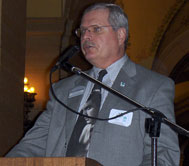The Arc Launches Dynamic New National Brand Identity
Washington, D.C. – The Arc, the largest organization advocating for and serving people with intellectual and developmental disabilities (IDD), including Down syndrome, autism, FASD, cerebral palsy and other diagnoses, is changing its look and adopting a new visual identity. The Arc is joined in the launch of this rebranding initiative by state and local chapters representing more than 30 states.
“This is an exciting time in The Arc’s history,” said Peter V. Berns, CEO of The Arc. Our powerful, new, shared identify reflects the energy and the action of our organization as we work to transform the lives of people with IDD. This impactful and fresh identity will move us further in revitalizing The Arc – an organization that has been on the frontlines of advocacy and service for over 60 years –by harnessing the incredible power of those we serve.”
The Arc’s vibrant new logo and tagline communicate the organization’s commitment to promoting and protecting the human rights of people with IDD and actively supporting their full inclusion and participation in the community throughout their lifetimes. The Arc’s logo is
emblematic of the organization’s embracing nature with the flowing “catalyst” icon; a burst of energy is symbolic of our support of independence. The new tagline, Achieve with us, conveys The Arc as a provider of opportunity, hope, growth and change.
The Arc’s new identity grew out of a lengthy, collaborative effort that began in spring 2008 and has involved literally thousands of The Arc’s volunteer and staff leaders, constituents and other stakeholders to create a visionary plan for the future: The Strategic Framework 2010-2019. A survey of chapters of The Arc demonstrated widespread support to rebrand and create a more compelling vision for The Arc.
The launch of The Arc’s new brand coincides with the commemoration of Developmental Disability Awareness Month in March. Nearly a quarter century ago, The Arc’s advocacy led to President Ronald Reagan officially proclaiming March to be Developmental Disabilities (DD) Awareness Month. Chapters of The Arc across the nation are celebrating DD Awareness Month with special events and activities. Over the past six decades, The Arc has championed groundbreaking legislation that has improved the lives of people with IDD.
“There is tremendous energy and ‘buzz’ as we begin to implement The Arc’s new brand identity” said Mohan Mehra, Board President of The Arc. “This will help raise public awareness of The Arc and translate to greater support at both the local and national levels. I am especially invested in the new brand and have been involved since the start of the process. Having served as a business manager with Kraft Foods with experience in business strategy, marketing and sales I know that a new brand can make a real difference.”
The Arc selected CoreBrand, an award-winning branding firm, to design and execute the new identity led by Brand Director Jonathan Paisner. “As a branding consultant, this was the rare opportunity to help discover and unleash a powerful brand simply waiting to be born,” Paisner said. “A true collective voice –- one shared by and reflected in over 700 chapters – will certainly be a boon to fundraising, volunteerism and visibility in the corporate world. Yet the true impact of a greater national presence will ultimately bring all of these elements together to advance The Arc’s goals of inclusion, hope, opportunity and achievement.”
The look and feel of the new brand will advance further with the May 10, 2011 national announcement of The Arc’s FINDS (Family and Individual Needs for Disability Supports) survey results at the National Press Club in Washington, D.C. The FINDS survey will yield a candid and current view on issues concerning the needs for disability supports across the lifespan. This unprecedented assessment of data from nearly 6,000 individuals will enable those in the field to better understand what services are available, what gaps exist and what new supports are needed.
Today, across the United States, the 700+ chapters of The Arc share common goals:
- The Arc is embracing, determined and experienced in promoting and protecting the rights of people with IDD;
- The Arc provides key needed services and supports across the arc of a lifetime and across diagnoses, such as Down syndrome, autism and many other intellectual and developmental disabilities.
- The Arc is banding together around the new and vigorous identity that embodies the energy and movement of The Arc to help people with IDD feel empowered and included.
“We are thrilled,” Berns added, “that upon the launch today we will have more than 150 of The Arc’s state and local chapters simultaneously unveil The Arc’s new brand identity in communities across the country. With close to 25% of chapters of The Arc on board already, and more chapters signing on daily, the successful implementation of our new brand strategy is well underway,” Berns explained.









